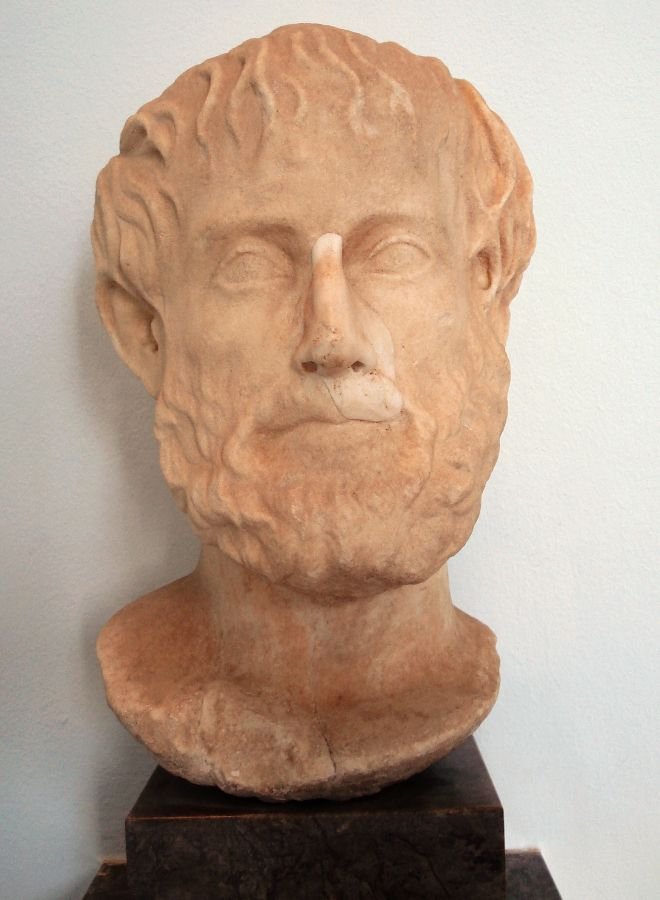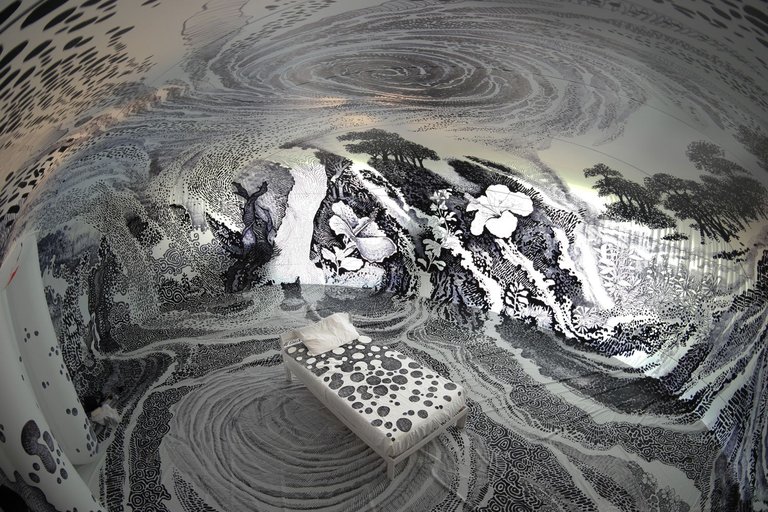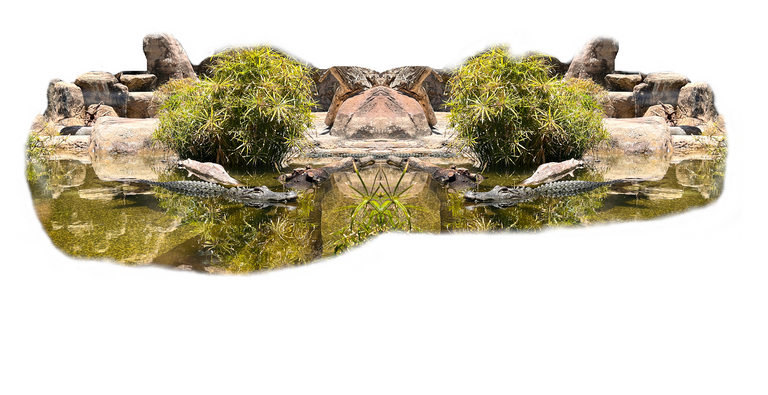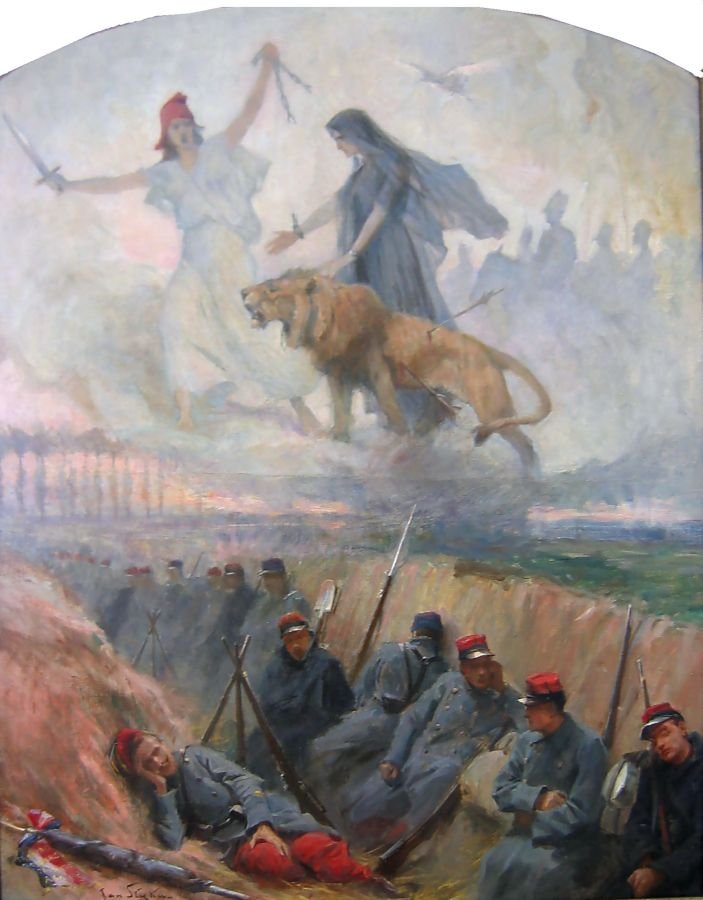Why Do We Dream? My Collage for LMAC #179
The Dream

Here is a smaller version of the collage, with sparkles:

This week, for the 179th LMAC collage contest, @shaka offered an even more amazing picture than usual. Have a look:

Dreams
This blog was supposed to go up days ago, but I made a mistake and published in the wrong community. Since then, I have kept the collage but have rewritten the blog. It is now about dreams. The image was inspired by a story I wrote that involved a very vivid dream, experienced by a character. Creating the collage led me to ask the question, What is the function of dreams?
The question has been answered many times, in many ways.
The Greeks
Plato believed that dreams could be prompted by divine intervention, or by a physical circumstance. A god may be sending a message, or the dream may prompted by a disturbance of an internal organ.
Aristotle, on the other hand, asserted that dreams were caused by "residual movements of the sensory organs". He even credited indigestion with being a possible cause.
Bust of Aristotle

Credit: Photo by G.dallorto. Used under CC Attribution-Share Alike Generic licenseThis bust was made in Ancient Rome and is a copy of the original crafted by the Greek sculptor Lysippos..
As much as we stare into the sky and wonder about distant galaxies, right here on earth, we have as great a mystery in the human brain. The brain has been dubbed the Final Frontier. There are a 100 trillion connections in our brain and there is much to be learned about most of these. Theories about dream cause and function is the province of neuroscience. Here are a few current theories.
Dreams of a Sleeping World

Credit: Installation at University of Southern California, Pacific Asia Museum. The Dreams of a Sleeping World. Image courtesy: © Oscar Oiwa Studio, NY. Used under Creative Commons Attribution-Share Alike 4.0 International license.
#The 'Fitness' Theory
Erik Hoel, a research assistant professor at the the Tufts Allen Discovery Center, worked with artificial neural networks to gain insight into how the human brain works. What Hoel learned was that repetitive task application helps a machine to learn how to do one task really well, but the machine don't learn how to apply that skill to new tasks. In order to have the skill carry over into other tasks, programmers introduce random variables into programs.
This narrow skill development Hoel terms 'overfit'. Hoel believes that the process of adding random data, 'noise', to a program is analogous to what dreams do in our brains. Instead of replaying events of the day and experiences over and over again, the brain introduces a little disorder--a dream.
Hoel explains that by dreaming, the brain breaks up "repetitive daily tasks...with an infusion of discord, keeping our brains fit".
#The 'Defensive Activation' Theory
Neuroscientists Don Vaughn (UCLA) and David Eagleman (Stanford) have a theory that is quite distinct from Hoel's. These two researchers tie in dreaming to the neurons in the visual cortex. They theorize that because humans are deprived of light during the hours of darkness, the visual cortex lacks stimulation for all that time. They suggested that neurons are, in a sense, territorial. If there is an absence of activation in one part of the brain, other neurons that are active will take over the territory.
They state: "We suggest that the brain preserves the territory of the visual cortex by keeping it active at night." Dreaming keeps the visual cortex of the brain active during the hours of dark.
They add, while this theory may seem less relevant in our electrified, modern age, our ancestors lived a great part of their lives in darkness. This is when the evolutionary development of dreaming occurred.
Dream of Polish Volunteers in French Trenches, 1914
Credit: Jany Styka (1858-1925). Public Domain
#'Consolidation of Memories' Theory
This theory comes out of the McGovern Institute at MIT. The director of the Institute, Robert Desimone (Professor of Brain and Cognitive Science) suggests that dreams help us to stabilize memories into a form of "long-term storage in the brain."
Dr. Desimone explains that most dreams are made up of experiences we've had, but that in dreams these events are jumbled. It is his theory that this jumbling is the brain's way of making sense of what has happened. We may put together related items in a not logical order, but in a way that is significant to us and our memory. He states, "...as the brain is processing memories, it pulls together the ones that are seemingly related to each other."

What is the purpose of dreaming? It seems this activity, that many animals--certainly all mammals--share is not much more clearly understood today than it was 2000 years ago. While neuroscientists can track our activity during the dream state, the question still remains, why do we dream?
I used many images from public domain sites outside of Hive, and I used many that were borrowed from LIL, the LMAC Gallery of images.
I thank these public domain contributors:
field
652234 on Pixabay
https://pixabay.com/es/photos/campo-hierba-naturaleza-paisaje-5429112/parachute
GuentherDillingen on Pixabay
https://pixabay.com/es/photos/paracaidista-paraca%C3%ADdas-paracaidismo-2183279/apples
NoName_13 on Pixabay
https://pixabay.com/es/photos/manzanas-manzana-roja-maduro-2788599/blueberries
Erbs55 on Pixabay
https://pixabay.com/es/photos/ar%C3%A1ndano-fruta-comida-baya-salud-625265/pears
manfredrichter on Pixabay
https://pixabay.com/es/photos/peras-fruta-pyrus-arbol-de-pera-3633119/blueberry bush
Go to Shannon Richards's profile
Shannon Richards on Unsplash
https://unsplash.com/photos/jJzmexjwfGEunicorn
GDJ on Pixabay
https://pixabay.com/es/vectors/vistoso-prism%C3%A1ticos-crom%C3%A1tico-1191082/water lilies
Prawny on Pixabay
https://pixabay.com/es/vectors/flor-floral-bot%C3%A1nico-planta-1837409/apple trees
analogicus on Pixabay
https://pixabay.com/es/photos/prado-paisaje-%C3%A1rboles-frutales-7196549/pear trees
shogun on Pixabay
https://pixabay.com/es/photos/naturaleza-paisaje-primavera-apogeo-3350362/
- Pegasus
Keraily_info on Pixabay
https://pixabay.com/es/illustrations/antecedentes-unicornio-espacio-6585352/
LIL
Thank you, fellow Hiveans for your contribution to my piece
flower
@ redheadpei
https://www.lmac.gallery/lil-gallery-image/10749
flower
@yaziris
https://www.lmac.gallery/lil-gallery-image/7645dogs
@tormenta
https://www.lmac.gallery/lil-gallery-image/8205
strange plant
@muelli
https://www.lmac.gallery/lil-gallery-image/7563raspberries
@alex2alex
https://www.lmac.gallery/lil-gallery-image/11460
Then, I contributed some elements:
Some Steps Along the Way





Every week is a unique adventure in the LMAC Collage contest. Every week I learn something. This week, I learned quite a bit about dream theory. And I had fun creating a collage that tried to reflect a dream state.
Please check out the LMAC curation feed to see the amazing works of art that the community artists have created.
Everyone who competes is a winner (I don't compete), but the Hive community selects the official winners. This week's list of winners is out. On Thursday, the contest begins anew. Please join in the fun.
You can see that LIL, the LMAC Image Library, was an essential part of my collage creating process this week. Everyone on Hive can contribute to the library and everyone can borrow from the library. Learn about the procedure here.
I wish all my readers peace and health.

The pictures indeed portrays dreaming
It is putting me in that mood...lol
Thank you, @rafzat. I hope you have the most vivid, lovely dream :)
There are many things in your collage interesting, I feel that the complement of everything is a bit abstract and at the same time beautiful.
Thank you very much! I had fun making this and doing the research. I'm glad you liked it.
Interesting topic and nicely explored in this post. Love the mix of research and animated dreamworld. Very creative!
Dreaming, and sleep in general, is such a common thing, and yet we know very little about it. It isn't until recently that scientists have figured out that during sleep, our brain washes itself. I also read in another article (which I can't find atm), that dreaming is correlated with this washing activity as different areas of the brain flush. The science is advancing in leaps and bounds and we're getting a glimpse into these ancient mysteries.
Thank you! I love the research you shared. Found an article from Harvard Medical School that talks about it:
https://www.health.harvard.edu/mind-and-mood/are-toxins-flushed-out-of-the-brain-during-sleep
All those people who brag they function well on only 4 hours sleep are perhaps cheating themselves and paving the way to cognitive issues.
It's kind of creepy but reminds me of what the body does with programmed cell death--apoptosis. I believe the lymph system carries these dead cells away, too.
Thanks for stopping by!
There might be some people able to sleep only a few hours, but the majority needs a good 7+ hrs of sleep. Otherwise, the brain doesn't flush properly and over the long term, problems develop. There might be some exceptions because at the neural level at least, we're not all created equal. Thanks for this thoughtful information, though I'm not keen on thinking about my dead cells just yet. heh
😅
Congratulations @agmoore! You have completed the following achievement on the Hive blockchain And have been rewarded with New badge(s)
Your next target is to reach 150000 upvotes.
You can view your badges on your board and compare yourself to others in the Ranking
If you no longer want to receive notifications, reply to this comment with the word
STOPCheck out our last posts:
I enjoyed reading about the different theories about the function of dreams. I think it's fascinating that there is still so much we don't know about this mysterious phenomenon.
I especially like the "Fitness" theory, which suggests that dreams help us to learn and grow by introducing a little disorder into our brains. I think this makes a lot of sense, and it's something that I've experienced myself. Sometimes, I'll have a dream that is completely bizarre and nonsensical, but it will still stick with me long after I wake up. I think these dreams are often the ones that help me to see things in a new way or to come up with new ideas.
I also think the "Consolidation of Memories" theory is very interesting. It makes sense that dreams would help us to process and store our memories. After all, our brains are constantly working to make sense of the world around us, and dreams are a way for us to do that in a different way.
Hello @malos10,
I did find this topic fascinating. And, as you say, we really don't understand dreaming at all, though we all dream. I'm what they call elderly, but I dream a lot, even though it is said the elderly don't dream much. It's interesting. They also say infants and very young children don't dream much. Dogs and birds, on the other hand do😄
I have a feeling I'll be writing about this again, maybe a science blog, more detailed.
Thanks for reading. I appreciate your intelligent, comprehensive feedback.
Wonderful collage and very interesting blog!
Thank you, @one-eye for your consistent support.
The consolidation of long-term memory through dreams is a fascinating process.
Greetings Agmoore nice collage.
Hello again, @innfauno12,
I was fascinated by this topic. Don't we all wonder why we dream about certain things in the way we do? Fortunately, my dreams are rarely bad. Usually they are interesting :))
Thanks for stopping by and for your positive comment.
Love all the little details ...but especially the sparkles!
The sparkles are not sophisticated and therefore not 'artistic', but I like them too.😁
Thank you!
Been long i was chanced to come read one of your collage blogs Sensei 😂😂😂
As imaginative and educative s usual.
In my country, dreams are taken as messages from a deity mostly (warnings of bad things or premonitions of good things to come )and it's commonly taken that someone who doesn't dream isn't spiritually inclined😂😂😂
I don't dream often though but when I do, I tend to take em seriously 😂
You don't dream often? I'm surprised. You have such a great imagination. I dream vividly.
My daughter wonders if her dreams mean something (portentous). I don't feel that way, but who know?
Thanks for reading and for your positive feedback. Hope you are having a pleasant summer, @seki1.
With my exams in the first week of August and my illness at the moment (getting better though)
Summer's looking pretty awesome 😃😔